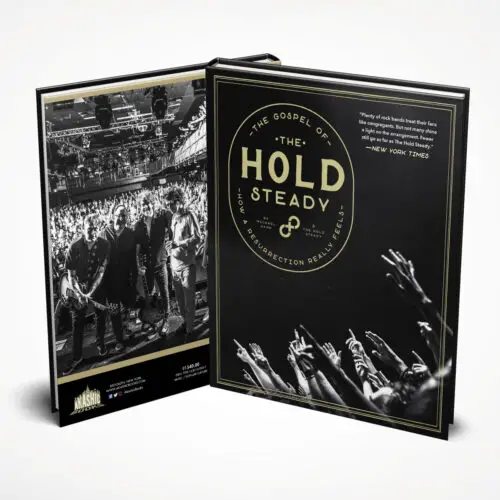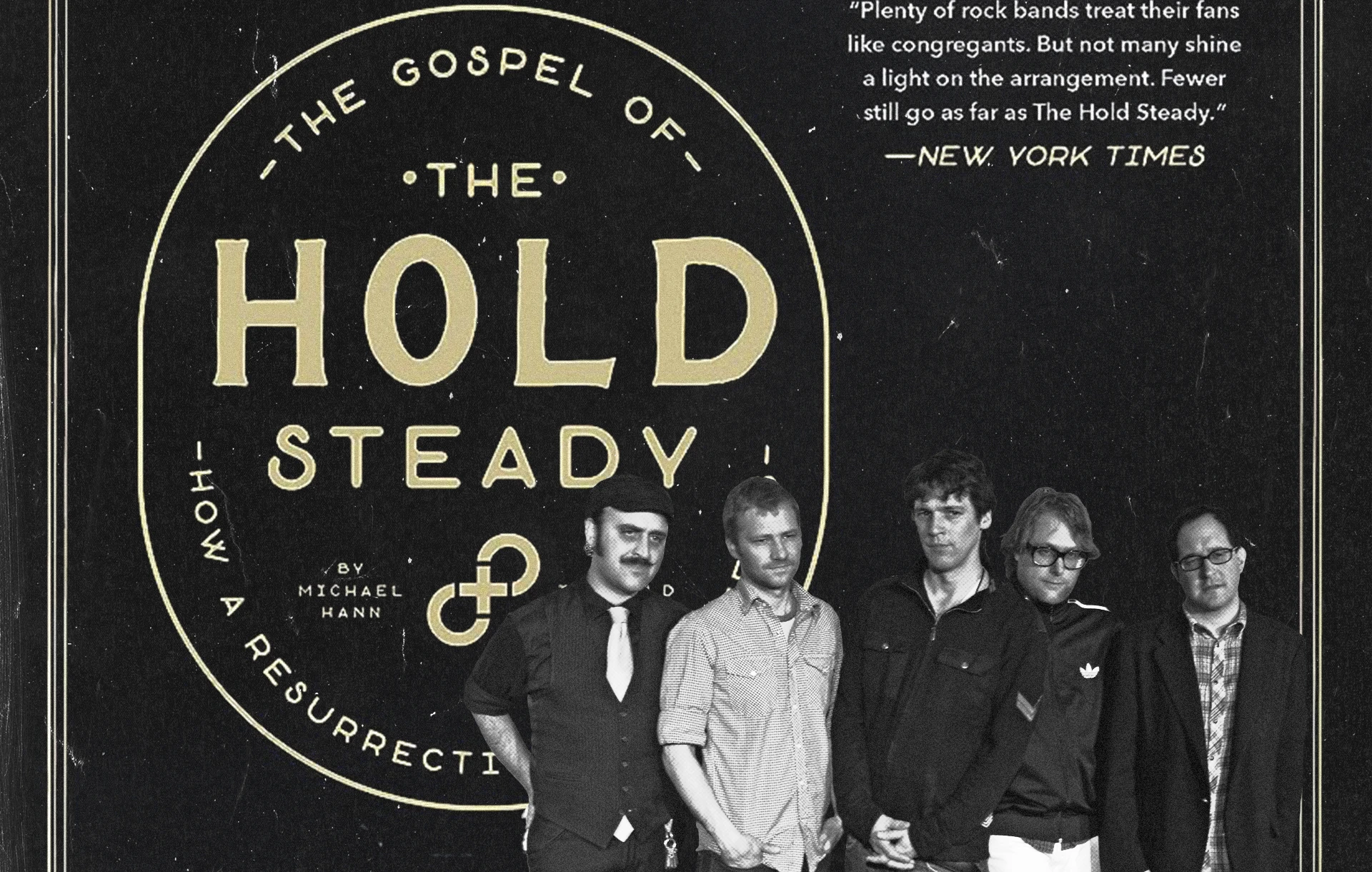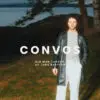
The popular Brooklyn (by way of Minneapolis and Ybor City) bar band The Hold Steady turns 20 years old this year, and they’re celebrating with a new album, plenty of shows in several of their favorite cities, and their own Positive Jam Festival, on August 5 in Accord, N.Y.
Another big part of the celebration is a new coffee table book, called “The Gospel of The Hold Steady: How a Resurrection Really Feels,” which was authored by the band itself and British music journalist Michael Hann. It features interviews with all six members of the band: frontman Craig Finn, guitarist Tad Kubler, keyboardist Franz Nicolay, bassist Galen Polivka, guitarist Steve Selvidge, and drummer Bobby Drake. The band will host a series of book signing events throughout the summer and fall.
It’s an oral history of the band, telling their story from their 2003 formation to the present, while also featuring essays by the likes of Rob Sheffield and Hann himself. The final section features testimonials from members of the “Unified Scene,” the name for the band’s fan base.
Amid the “so much joy” for which the band is known the book goes to some dark places, including descriptions of infighting between band members and a dark period when it looked like the band would break up (the group seems unanimous that the “Teeth Dreams” album from 2014 wasn’t their best work.) But The Hold Steady has since reconstituted, with Nicolay returning to the fold and the group doing fewer (and better) shows each year, always culminating in the year-end Massive Nights run in New York City.
We talked to Michael Hann about the book, the band, the process of writing an oral history, and how he became a part of the Unified Scene.
I’m interested to hear how this book came about. Did they come to you? Did you go to them? Who had the idea originally?
They came to me. I’ve been friends with Craig since 2007, and I’m a music journalist, I did music for The Guardian, and I’ve been freelance since 2017. And I had a book of my own out, which was called Denim and Leather, about the New Wave of British heavy metal… and when that came out Craig got in contact with me and said the band was thinking about doing a book about the 20th anniversary, and would I be interested in doing it? And I said yes, of course.
How long was the process of working on the book?
It was not terribly long…. this what was not a book from which I’m going to be buying country houses. There was not a vast fee for it, so it was a question of kind of finding a format that worked, in terms of making it not too un-worthwhile for me, as it were. My book had been an oral history, I enjoy that format, and I think I’m really good at it. The only stipulation being that everyone be interviewed.
Bobby, for example, is not the most loquacious of interviewees, so I [decided] that I don’t think it’ll work to do separate chapter interviews with people. Also, I had no interest in writing a kind of critical history, because the book is for the fans.
The fans know what they think of the records, they don’t need anyone else telling them what they think of the records. I said in terms of getting all the voices represented, I think an oral history would be the best way to do it. And the band also thought it would be good to have essays by other people involved, which I commissioned because obviously there are some great writers who are fans of the band, people like Rob Sheffield. And the other thing they wanted was the voices of the fans, so we put out an appeal for fans to send me their stories and memories, which I edited into shape.
It wasn’t that onerous. In a previous book, I did a hundred interviews. So it probably took maybe four or five months, from start to finish, and I wasn’t working on it full-time during that period. I did repeated interviews with Craig and with Tad, and long interviews with Steve, with Galan, and with Franz, and with Bobby, we spoke for about a half hour because he answered everything in single sentences.
I don’t know if you’ve ever seen the film The Promise: The Making of Darkness on the Edge of Town. They talk about Clarence Clemons’ sax on that album, and Jon Landau says “There’s hardly any sax on there, but we use it in the right places, so there’s a lot more impact, and you think there’s a lot more sax than there is.” I kind of think of Bobby’s contributions as being like that; when he has something to say, it’s usually very funny, and it kind of really leaps out from the page. But the bulk of the narrative is carried by Craig and Tad.
I was going to ask about the logistics. Did you sit down with everyone in person? Did you do it on Zoom, or on the phone?
It mainly was on Zoom, because I’m in London and they very much are not. I did some interviews when I was over for Massive Nights, at the end of ’21. Meanwhile, it was on Zoom, over the next two to three months. And, you know, it could be a hassle, getting people to turn up at the appointed time because that’s what rock musicians are like.
But everyone was very helpful. It’s their book, so they had an incentive to turn up and cooperate, which they all did, and they were all very frank. There was stuff in the book that fans maybe didn’t know or fans maybe only knew the broad brush outlines of, things like Tad’s illness, or Tad’s problems with addiction. But the band was very forthright, honest, and open about all of that, and I think they needed to be. I think they understood that.
I am in middle age, and they are in middle age, at this point, there’s almost no point in pretending that everything has always been golden age and rosy because that’s not what middle-aged lives are like.
That was something that really stood out to me in the book. Craig always says in the shows, “There is so much joy” – only to find out, there wasn’t always so much joy. We even have them admitting that there were some shows that they didn’t feel that great about, and the album, as well, that they all pretty much admit wasn’t their best work.
Yea, “Teeth Dreams.” I remember seeing them in that period, and I remember thinking ‘This band doesn’t seem to be that long for this world, to me.’ When they went off the road after Teeth Dreams and Craig made the solo album, I remember thinking ‘I bet they don’t get back together.’ I know that Tad thought the same thing. Tad actually emailed me to say ‘Craig’s solo record – do you think this is the end of the band?’
As Craig says in the book, that was what they needed. They need that time to breathe, to remember what it is that they liked about being in the band. But yea, there were some pretty desperate times, and I remember thinking at the time that Craig, without a guitar around his neck, seemed like a symbol for something, that was wrong. It’s not that he plays guitar that much, the fact that he had that around his neck seemed symbolic of something, when they did that tour when he didn’t have it, it seemed like he didn’t quite know what to do on stage, and yea.
I really think, the last few years, they’re a better live band than they’ve ever been. And the shows… have just been stellar.
Yea, I mean I don’t think I’ve ever seen them and thought it wasn’t a good show, but the last two times I saw them, I just remember thinking it was really off the charts. And having six pieces, with everyone in the band, that’s been great too. So I think you tell the story in the book – when did you yourself first discover The Hold Steady?
I first heard of them through Pitchfork, reading the review of Separation Sunday, and thinking “This sounds extraordinary,” and then buying it off iTunes, because they didn’t have a deal in the U.K., at that point, in 2005 or 2006.
I didn’t know that they had been over for one U.K. show, opening up for Les Savy Fav, at a little venue in London. I remember thinking that must have cost them money, one show, as the opening act, in a small venue, I’m trying to think of the economics of that. I took over running the film and music section of the Guardian newspaper in 2006, and later that year, I got a press release announcing the first U.K. single, “Chips Ahoy!,” by an American group called The Hold Steady. I wrote straight back to the publicist and said “Thank God someone has picked up this group for the U.K.!”
They came over and did some shows that February, early in 2007, and I went to the first of those shows. I had given Boys and Girls in America a five-star review in The Guardian, and that first show they did it just blew me away. That was great, I left the venue, I’m at a pub with my friends, and the publicist texts me and says “Do you want to come back and meet Craig?”
I very rarely do that, I do take the view that ‘why would anyone want a complete stranger to come up and talk to them after they’ve just done a 90-minute rock show? And equally, what am I going to get out of making an awkward conversation with someone? And also, I do have a certain belief in the distance between journalist and subject. But I did go back, and Craig and I, we just got on. We talked about sports for ages, we talked about music, and before we knew it it was 2:30 in the morning, and the staff was trying to pack up the club, and they were the only people left.
So we kept in touch, and when The Hold Steady came over subsequently, we’d go out for drinks, go to sports…. we became closer and closer friends. Whenever I go over to New York for whatever reason, we always meet up. But I never stopped loving the music, and the shows were always the heart of it. I go over for Massive Nights every year, and I’m not an employee of the band, this is all my own money. I’m pretty obsessive about this band, they’re highlights of my year, especially Massive Nights, and when they come over for The Weekender in London.
From that first show, I was just convinced that they were the greatest live band that the world could possibly imagine, and I never really lost that conviction. It helps that the sets change. Every show offers something different, but the common theme is the joy.




